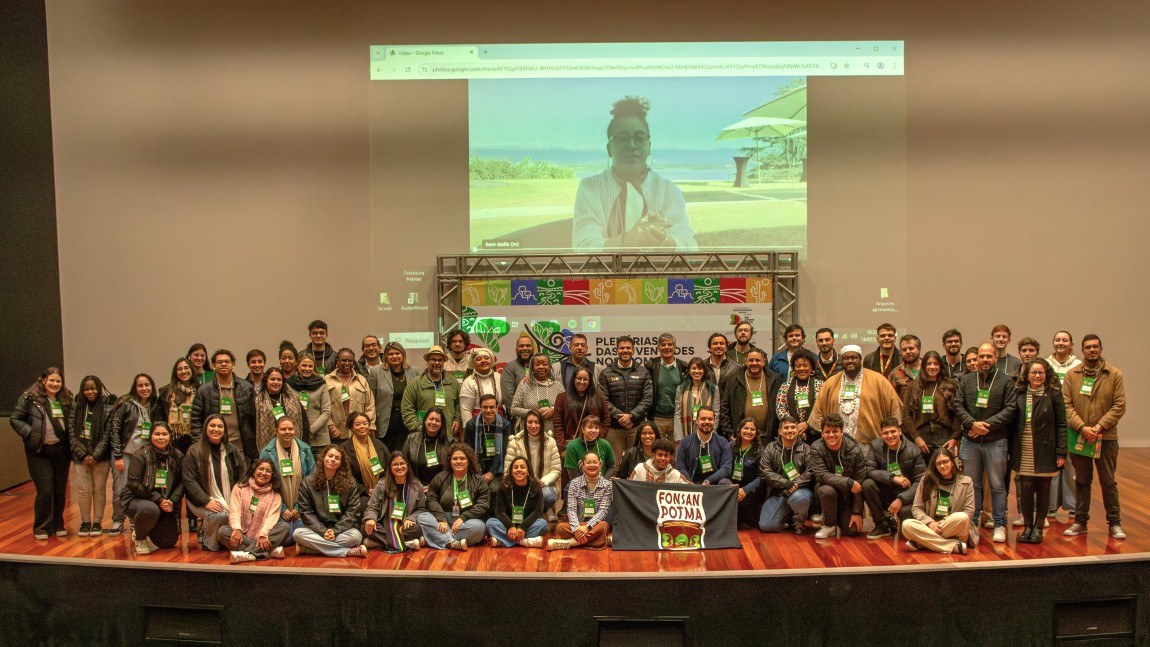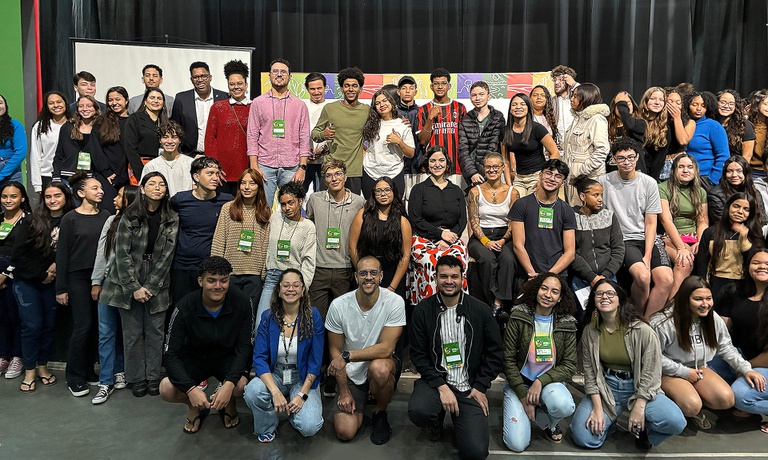Brasil selects young representatives from all six biomes to shape COP30 agenda
As part of the Climate Change Initiative, the National Youth Secretariat (Secretaria Nacional de Juventude/SNJ) is leading a federal initiative that emphasizes the important role of young people in the climate agenda through active, critical, and creative participation. Two young people will be selected per biome in a series of stages that will run until August

By Franciéli Barcellos de Moraes | COP30 Brasil
The consequences of climate change are already evident, but the most severe impacts—absent urgent and ambitious adaptation and mitigation plans—are yet to unfold. These disproportionately affect younger generations, who often remain marginalized from critical climate policy decision-making.
Seeking to rebalance the generational representation in these spaces, the federal government, through the SGPR, is hosting Youth Plenaries in the six national biomes until August in partnership with the National Youth Council (Conselho Nacional de Juventude/CONJUVE), the COP30 Youth Champion, and the United Nations Children's Fund (UNICEF). These meetings aim to engage Brazilian youth with the processes of the COP30 theme and elect representatives to participate in the conference in Belém, PA. SNJ is organizing the initiative. Currently, the department is attached to the Presidency of the Republic within the remit of the SGPR, regaining prominence by proposing activities such as these.
The National Secretary for Youth, Mr. Ronald Sorriso, stressed that expanding the space for the younger generations on the climate issue qualifies the debates by valuing active, critical, and creative participation. He also stressed that the COP needs to be seen as more than just an event, but as a process for changing paradigms. “A major point is that the plenary sessions aim to meet a recurring demand from young people, which is environmental education,” he added.
Mr. Guilherme Barbosa, Director of Coordination and Support for Youth Programs and Projects at SNJ, affirmed the success of the initiative, citing the first two plenaries as confirmation. He stated that these sessions are fundamental for identifying specific local needs. “SNJ is investing in this process because we recognize that young people—especially those from historically neglected territories—are already confronting the daily effects of climate change. Building these listening spaces is crucial to enabling their participation in the world’s major climate decisions and aligning them with the real demands of their communities,” he underscored.
Building these listening spaces is crucial to enabling their participation in the world’s major climate decisions and aligning them with the real demands of their communities”
— Mr. Guilherme Barbosa, Director of Coordination and Support for Youth Programs and Projects at SNJ
The plenaries serve as vital opportunities for training, listening, and mobilization of youth across the Amazônia, Caatinga, Cerrado, Mata Atlântica, Pampa, and Pantanal regions. Guided by local realities, these sessions aim to deepen awareness of environmental issues and explore innovative solutions for confronting climate change. Participants also engage in a technical visit to a preserved area within the local biome, offering practical exposure.

At the pre-COP held in June in Bonn, Germany, youth leaders collectively called for greater recognition of their role, advocating for structured participation, dedicated funding, and decision-making power—demands that are now central to the discussions unfolding at the Brazilian plenaries.
One of the largest public opinion surveys ever conducted on climate issues— interviewing around 1.2 million people from 50 countries — showed that young people are the most concerned about the climate emergency worldwide. Conducted by the United Nations Development Program (UNDP) together with Oxford University, the survey found that young people are increasingly engaged in the environmental agenda.
Ms. Marcele Oliveira, 26, the COP30 Youth Climate Champion, reflects this reality. Her activism began with a recognition of the environmental racism prevalent in her community. Today, she oversees the articulation of global youth towards COP30 in November. "In Brasil, floods, droughts, heatwaves, and disasters hit from north to south, with the greatest impact always on peripheral communities and their children and adolescents. In this context, the biome plenary sessions are a space for training and also for strengthening the work of these young people, contributing directly to the Global Youth Statement," she said, referring to the importance of this initiative, in which she is also involved.
At the beginning of July, successful sessions were held in Luziânia, Goiás (representing the Cerrado biome) and in Pelotas, Rio Grande do Sul (representing the Pampa biome). These two events gathered approximately 300 participants.
Meet the youth representatives already selected
CERRADO Biome
Daniel Ildefonso, 19, Brasília (DF): A Public Policy Management student at the University of Brasília (UnB) and director of his program’s student association;
Lorena Mathyê, 16, Luziânia (GO): A second-year-high school student and an active member of the Student Council at the Federal Institute of Goiás.
PAMPA Biome
Paula Hann, 21, Pelotas (RS): An International Relations student at the Federal University of Pelotas (UFPel) and a researcher focusing on foreign policy with an emphasis on public diplomacy;
Victor Salama, 17, Pelotas (RS): A second-year high school student and a member of a traditional African-descendant community. He contributed to maintaining Casa da Árvore, a self-managed space founded on principles of solidarity economy.
Upcoming plenaries:
Caatinga: July 28–29, in Caruaru (PE) – Municipal Education Department, Avenida Cícero José Dutra, s/n
Mata Atlântica: August 4–5, in Belo Horizonte (MG) – Youth Reference Center, Rua Guaicurus, No. 50
Pantanal: August 7–8, in Campo Grande (MS) – Day 1: Federal University of Mato Grosso do Sul, Complexo R. UFMS, No. 715. Day 2: Bioparque Pantanal, Avenida Afonso Pena, No. 6277
Amazônia: August 19–20, in Macapá (AP) – Location to be confirmed
